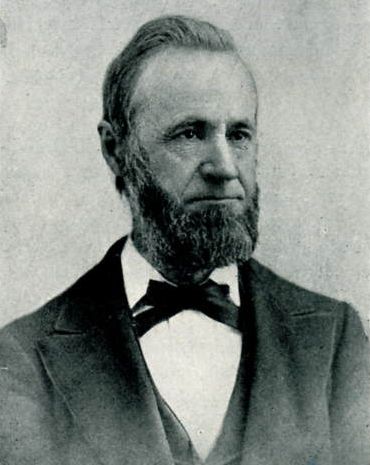| Thomas
McIntyre Cooley
"Thomas McIntyre Cooley was born on a farm near Attica, New York, January 6, 1824, son of Thomas and Rachel (Hubbard) Cooley. . . . His father was one of four brothers who early removed from Massachusetts to Western New York, where they encountered the hardships of pioneer life. The boy attended the district school of the neighborhood and later spent three years at Attica Academy. As a schoolboy he showed unusual intellectual powers and an enthusiastic fondness for learning in the fields in which he afterwards became famous. In 1842 he began to study law in an office at Palymra, New York, and the next year removed to Michigan. He read law at Adrian three years, doing both professional and other work as a means of support, and was admitted to the Bar in 1846. With the next nine years he practised law in three different Michigan towns, engaged in the real estate business in Toledo, and was also active in local politics. In 1857 he was selected by the Legislature to compile the statutes of Michigan, and in 1858 was appointed Reporter of the State Supreme Court. On the establishment of the Department of Law at the State University in 1859 he became one of the original Faculty. He was assigned to the Jay Professorship of Law, which position he continued to fill with great distinction for twenty-five years. He removed to Ann Arbor in 1859 . . . . In 1885 he was appointed Professor American History and Constitutional Law and continued in that capacity until his death. The office of Reporter to the Supreme Court, which he held from 1858 to 1865, was the stepping-stone to a seat on the State Supreme Bench. He was elected a judge of this court in November, 1864, in place of Randolph Manning deceased, and was twice re-elected, serving in all twenty-one years. . . . After his resignation from the Supreme Bench in 1885 he did distinguished legal work in connection with the railroads of the country. . . . In 1886 he was appointed receiver of that part of the Wabash Railroad System which lies east of the Mississippi River, and the next year President Cleveland appointed him chairman of the newly authorized Interstate Commerce Commission. Owing to failing health he resigned from the Commission in 1891. In 1893 he was president of the American Bar Association . . . . He ceased to lecture in the University and abandoned all law practice in 1894. He died at Ann Arbor, September 12, 1898. He received the degree of Doctor of Laws from the University of Michigan in 1873 and from Harvard University in 1886." [Burke A. Hinsdale, History of the University of Michigan with Biographical Sketches of Regents and Members of the University Senate from 1837 to 1906 234-235 (Ann Arbor: Published by the University, 1906)(Isaac N. Demmon ed.)]
Burke A. Hinsdale, History of the University of Michigan with Biographical Sketches of Regents and Members of the University Senate from 1837 to 1906 234
"Thomas Cooley . . . cultivated literary interests and broke the pattern of generations of Cooleys by turning away from farming to what was perceived as the more refined profession of law. He read law briefly in New York and in 1843 went west to Michigan, settling in the town of Adrian where he practiced law, edited a Democratic newspaper, wrote poems, and engaged in Free Soil politics as a 'Progressive Democrat.' * * * * Cooley gained his legal distinction gradually--as compiler of the statutes of Michigan in 1857, as reporter to the Michigan Supreme Court in 1858, as one of the first three professors in the law department of the University of Michigan in 1859, and in election to the Supreme Court of Michigan in 1864." [Alan Jones, Law and Economics v. A Democratic Society: The Case of Thomas M. Cooley, Charles H. Cooley, and Henry C. Adams, 36 Am. J. Legal Hist. 119, 123, 124 (1992)] Bibliography Clyde Edward Jacobs, Law Writers and the Courts: The Influence of Thomas M. Cooley, Christopher G. Tiedeman, and John F. Dillon Upon American Constitutional Law (Berkeley, California: University of California Press, 1954) Paul D. Carrington, 'The Common Thoughts of Men': The Law-Teaching and Judging of Thomas McIntyre Cooley, 49 Stan. L. Rev. 495 (1997) Alan Jones, Thomas M. Cooley and the Michigan Supreme Court: 1865-1885, 10 J. Am. Hist. 97 (1966). "Thomas M. Cooley," in John R. Vile, Great American Judges 175-`81 (Santa Barbara, California: ABC-CLIO, 2003) |

